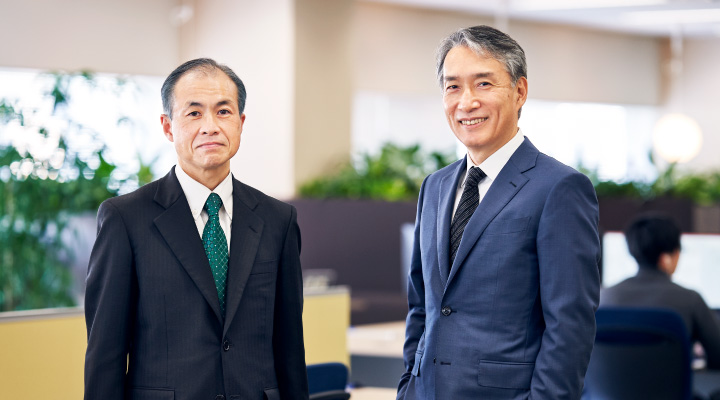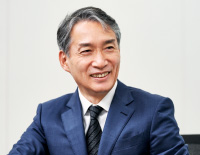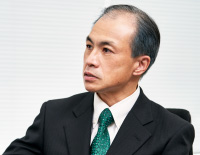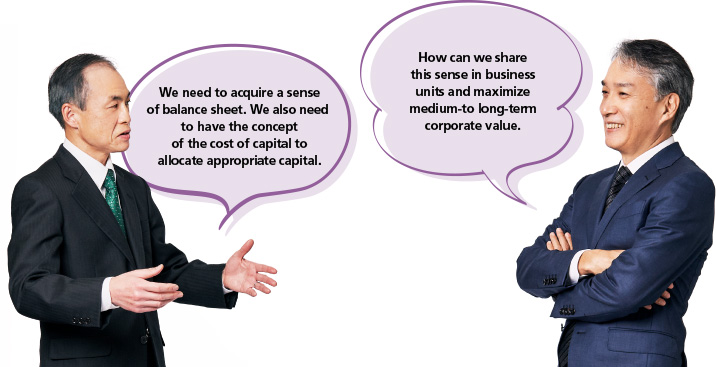Financial Thinking Creates Value for the Future

Director, Group CFO, AVANT Corporation
Naoyoshi Kasuga
President and Group CEO, AVANT Corporation
Tetsuji Morikawa
Morikawa I would like to discuss the enhancement of the corporate value with Mr. Kasuga, Group CFO. It’s been more than 10 years since we met, hasn’t it?
Kasuga I joined DIVA (now Avant) in October 2010, immediately after the Global Financial Crisis.
Morikawa Since our founding in 1997, we have worked to increase sales by creating businesses and increasing the number of customers. And if we could match that wheel with the other wheel of cash flow, we would reach our goal “create a 100-year company” at the end of the line. That was the original idea. However, when I began to think about corporate value as we became listed on the stock market, I began to feel uncomfortable with my accounting-like thinking. At the end of our various thinking I ended up with the financial thinking. Corporate value is an assessment of the certainty of the expected value of “how much it can earn in the future.” Within this context, market tend to value highly of the software companies who leverage their corporate value and invest in growth even if their operating cash flow is negative. When I began thinking about this, I met you, Mr. Kasuga, who was well experienced in the midst of financial community as corporate officer of the New York Stock Exchange in the U.S. I thought that if this person participates with us, we would be able to develop financial thinking more practically.
Kasuga Immediately after joining the Company, Mr. Morikawa consulted with me that he would like to create a system in which he would divide his responsible business profit and loss as CEO into several units where the leaders of each units should commit to P&L responsibility.
Morikawa Before we start financial thinking, we had an issue where P&L management in the true sense was not practiced. I believe that it is necessary to have a system in which management is segmented, crystalize risks, and the bottom-line approach is taken into consideration while managing profitability. Thanks to your advice, our management began to work when P&L management began to take root as philosophy.

Kasuga Subsequently we have acquired ZEAL.
Morikawa It was in 2012. How did you define that project in management of Avant?
Kasuga That was the first transaction financing for DIVA using its balance sheet. We could have done it without borrowing, but the cost of finance was low, and we dared to borrow because we wanted to earn at least enough money to repay the loan. It was the same size as DIVA at that time, and it certainly turned out to be a very big turning point.
Morikawa How do you evaluate the deal from CFO’s perspective?
Kasuga Honesty, at the time, I did not understand much of the implications of bringing ZEAL into the Group (lol). Later, I noticed that it would have the effect of stabilizing the sales and the income.
Morikawa Some of the companies that started up as ventures and grew into global companies seem to have visions that cannot be immediately understood from outside as they engage in various businesses. Sometimes a seemingly different business, such that makes us wonder why they start it, could be connected over a period of ten to twenty years and enhance the value of the group. That is the vision, or a world view of the management, and in my case too, it’s organized in terms of vision. However, such an idea is difficult for the CFO to understand, isn’t it?
Kasuga Finance thinking is fundamentally inductive. You have a track record, and then we argue about the N+1 period. If you use such inductive thinking, you cannot see the future. Therefore, it is necessary for Avant’s CEO to demonstrate the path based on the idea of what the future should be.

Morikawa How do you perceive corporate value?
Kasuga In textbook terms, it is the present value of projected cash flows. However, as the Avant Group is shifting to SaaS model, we believe that the traditional concepts of P&L and the concepts of valuation (company value assessment) cannot apply. We need an approach to evaluate what amount of sales per customer is, how much costs are for it, and what value per customer is. I think that we are going to go on a very different dimension that has not often been talked about in finance theory so far.
Morikawa Finance means investment return. What is your benchmark of investment return at the Avant Group?
Kasuga In terms of the cost of capital, it is around 8%.
Morikawa Are you conscious of that?
Kasuga I’m conscious of it, and I hope that more people will be aware of it in the future. For us, the cost of capital is the cost of equity, but how to lower the cost of equity is important, and one is to increase liquidity and increase volume. Another is to reduce business risk as much as possible. In this sense, I believe that the transition to a SaaS will certainly lead to a reduction in the cost of capital in the future.
Morikawa In terms of shareholder returns, I think there are discussion of whether it is capital gains or income gains. What are your thoughts on the balance between these?
Kasuga Since we cannot guarantee capital gains, we should pay attention to the minimum income gains. Our policy is to increase dividends per share to long-term investors in a steady manner so that the benefits of holding our shares will be reasonable. In terms of stability, I would like to basically raise the dividend on equity (DOE) to a certain level and, if possible, in the top level for companies listed on the First Section of the Tokyo Stock Exchange.
Morikawa If you base it on DOE, we naturally have to earn resources, so ROE will also become important. Assuming the top DOE level at 8%, the ROE to support this should be quite high.
Kasuga I would say no less than 20% at least. ROE has multiple elements such as return on sales and asset turnover, and finally financial leverage. I don’t think it is a righteous way to use financial leverage only (lol), I would like to pursue it in core business: how to increase profits and increase asset turnover.
Morikawa If the average funding cost for listed Japanese companies is 5-7%, our cost of capital is not that high.
Kasuga Kasuga: Certainly so, but I think I can lower it.
Morikawa Do you have a guide?
Kasuga I think that if we leverage the balance sheet based on business needs, we may be able to lower it by 1 or 2 points.
Morikawa We can see our ROE by making solid profits if we extend organic growth with our current capital structure. On the other hand, when it comes to effective use of funds, I think M&A will be a very important means of growth, at this interest rates. Please tell us your thoughts on this M&A from the CFO’s perspective.
Kasuga We now have a decent amount of cash, so there is no doubt that this will be one of the options for effective use.
Morikawa There is a large market for management information systems, so in order to maximize our growth potential, we should focus on how to accelerate our core business while using capital resources.
Morikawa Value creation requires investment, and I believe that having rules for diversifying investment will make a huge difference in the next phase. What do you think?
Kasuga What I want to do is to create the segment balance sheets. People here have assumed the P&L management. As a next step, we need to acquire a sense of balance sheet. We also need to have the concept of the cost of capital to allocate appropriate capital.
Morikawa How can we share this sense in business units and maximize medium-to long-term corporate value? I think that will be our major theme in the future. On the other hand, it is also important to create synergies as a group while autonomously dispersing risk management and other matters. As these interact closely with each other to enable balanced management, we are approaching the creation of a 100-year company.
Kasuga Exactly.
Morikawa Ultimately, we must be motivated to contribute to the society, that’s the vision. But it is also true that corporate activities based on that vision are evaluated in terms of financial returns. With this in mind, I would like to see the managers of each operating company broaden the scope of their conversations not only within the company but also to the entire group, and make a major shift in direction so that they can create value from their respective perspectives. In order to realize sustainable growth through dialog with such diverse stakeholders, we still need knowledge and advice based on your achievements.
Kasuga I’ll help you as much as I can.
Morikawa Thank you for your continued cooperation.
